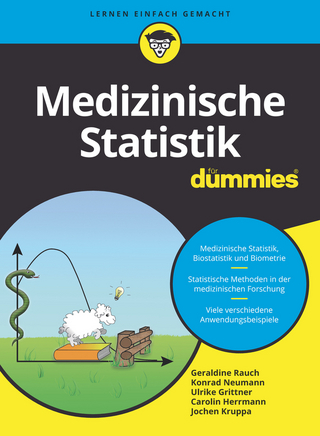
Causal Inference
Crc Press Inc (Verlag)
978-1-4200-7616-5 (ISBN)
- Noch nicht erschienen (ca. Juli 2025)
- Versandkostenfrei innerhalb Deutschlands
- Auch auf Rechnung
- Verfügbarkeit in der Filiale vor Ort prüfen
- Artikel merken
Causal inference is a complex scientific task that relies on evidence from multiple sources and a variety of methodological approaches. By providing a cohesive presentation of concepts and methods that are currently scattered across journals in several disciplines, Causal Inference: What If provides an introduction to causal inference for scientists who design studies and analyze data. The book is divided into three parts of increasing difficulty: causal inference without models, causal inference with models, and causal inference from complex longitudinal data.
FEATURES:
• Emphasizes taking the causal question seriously enough to articulate it with sufficient precision
• Shows that causal inference from observational data relies on subject-matter knowledge and therefore cannot be reduced to a collection of recipes for data analysis
• Describes causal diagrams, both directed acyclic graphs and single-world intervention graphs
• Explains various data analysis approaches to estimate causal effects from individual-level data, including the g-formula, inverse probability weighting, g-estimation, instrumental variable estimation, outcome regression, and propensity score adjustment
• Includes software and real data examples, as well as ‘Fine Points’ and ‘Technical Points’ throughout to elaborate on certain key topics
Causal Inference: What If has been written for all scientists that make causal inferences, including epidemiologists, statisticians, psychologists, economists, sociologists, political scientists, computer scientists, and more. The book is substantially class-tested, as it has been used in dozens of universities to teach courses on causal inference at graduate and advanced undergraduate level.
Miguel Hernán conducts research to learn what works to improve human health. Together with his collaborators, he designs analyses of healthcare databases, epidemiologic studies, and randomized trials. Miguel teaches clinical epidemiology at the Harvard-MIT Division of Health Sciences and Technology, and causal inference methodology at the Harvard T.H. Chan School of Public Health, where he is the Kolokotrones Professor of Biostatistics and Epidemiology. His edX course "Causal Diagrams" is freely available online and widely used for the training of researchers. James Robins is a world leader in the development of analytic methods for drawing causal inferences from complex observational and randomized studies with time-varying treatments. His contributions include new classes of estimators based on the g-formula, inverse probability weighting of marginal structural models, and g-estimation of structural nested models. He teaches advanced epidemiologic methods at the Harvard T.H. Chan School of Public Health, where he is the Mitchell L. and Robin LaFoley Dong Professor of Epidemiology.
Part I: Causal inference without models 1. A definition of causal effect 2. Randomized experiments 3. Observational studies 4. Effect modification 5. Interaction 6. Graphical representation of causal effects 7. Confounding 8. Selection bias 9. Measurement bias 10. Random variability Part II: Causal inference with models 11. Why model? 12. IP weighting and marginal structural models 13. Standardization and the parametric g-formula 14. G-estimation of structural nested models 15 Outcome regression and propensity scores 16. Instrumental variable estimation 17. Causal survival analysis 18 Variable selection for causal inference Part III: Causal inference from complex longitudinal data 19. Time-varying treatments 20. Treatment-confounder feedback 21. G-methods for time-varying treatments 22. Target trial emulation 23. Causal mediation
| Erscheint lt. Verlag | 30.7.2025 |
|---|---|
| Zusatzinfo | 21 Tables, black and white; 128 Line drawings, black and white; 128 Illustrations, black and white |
| Verlagsort | Bosa Roca |
| Sprache | englisch |
| Maße | 210 x 280 mm |
| Gewicht | 453 g |
| Themenwelt | Mathematik / Informatik ► Mathematik |
| Studium ► Querschnittsbereiche ► Epidemiologie / Med. Biometrie | |
| Naturwissenschaften ► Biologie | |
| ISBN-10 | 1-4200-7616-7 / 1420076167 |
| ISBN-13 | 978-1-4200-7616-5 / 9781420076165 |
| Zustand | Neuware |
| Haben Sie eine Frage zum Produkt? |
aus dem Bereich


